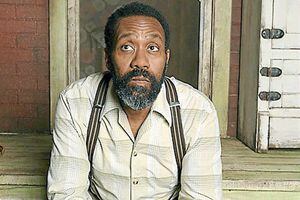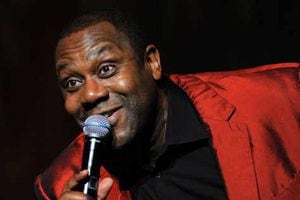For those of you watching in black and white: Lenny Henry on telly and race
Lenny Henry is a Black Country icon, a Dudley lad-turned-household name. He knows what he is talking about when it comes to telly and race.

Now he's calling for funding to be set aside to increase the number of black and minority ethnic actors on television, warning that there has been an 'appalling drop' – and now wants TV execs to allocate funding to make up the difference.

His figures make for alarming reading, but I'm not sure the answer is money. I'm acutely aware that as a white man, whose only experience of TV is the 32 years I've spent watching it, that arguing the case against the pioneer of Comic Relief and the star of the sitcom Chef puts me on shaky ground.
Watch Lenny's speech here:
But what he's looking for – funding for programmes based on the number of black and minority ethnic actors – is effectively positive discrimination. And in my humble opinion there's never anything positive about discrimination.
The brilliant Iranian-born comedian Shappi Khorsandi calls herself 'the little box ticker' because she is part of a small band of minority ethnic women in the business. But it's an insult to suggest that she'd only be able to get on because the colour of her skin makes her a priority.

Lenny says the situation has 'deteriorated badly', with the number of black, Asian and minority ethnic (BAME) people on TV having fallen by 30.9 per cent between 2006 and 2012.
"Black, Asian and minority ethnic representation was just 5.4 per cent," Lenny said about 2012 programmes in his 85-minute Bafta Television lecture and question and answer session.
"That's an appalling percentage, more so because most of our industry is still based around London where the BAME population is 40 per cent."
He wants three criteria for funding BAME shows. He is insisting on 50 per cent of production staff coming from BAME backgrounds and 50 per cent of on-screen talent. He also wants the production company controllers and executives to be 30 per cent BAME. "Our most talented BAME actors are increasingly frustrated and they have had to go to America to succeed," Lenny said.
"You know who I'm talking about. David Oyewolo in The Help and The Butler, Idris Elba in Long Walk to Freedom, Prometheus and The Wire, Thandi Newton in Crash, Mission Impossible, Chiwetel Ejiofor in 12 Years A Slave, he was good in American Gangster too, David Harewood in Homeland, Lennie James in The Walking Dead and Jericho, Marianne Jean-Baptiste, ladies and gentleman, our first black, British female Oscar nominee for Secrets and Lies had to go stateside to find work in Without a Trace, Archie Panjabi in The Good Wife. All received a measure of success here but were frustrated at the lack of opportunity in the UK."
But hang on a minute.
Surely, if you were to tell a young British actor, regardless of their race or background, that they could go to Hollywood and become an A-list star, wouldn't they do it?
Every single one of the actors Lenny Henry listed is fantastic on their own individual merits.

Idris Elba, whom Lenny lists as one of those 'frustrated' at their international stardom, is frequently linked with being a replacement for Daniel Craig as James Bond.
Except that Elba hates talk of tokenism. "I've always detested the phrase 'Black Bond', I just don't understand it," he said
"We don't say 'White Bond', we just say 'Bond', so it suddenly becomes a black man and he's a 'Black Bond'. So I hate that phrase."
That reads to me like a great actor of the 21st century wanting to be judged for his talent on screen.
He's worked his way up from parts in Bramwell and the erstwhile Channel 5 soap Family Affairs to blockbuster Hollywood films like Prometheus, cult classics like The Wire and over here as the title role in gritty cop drama Luther.
The fact that it isn't coming back for a fourth series is nothing to do with British TV studios not wanting Elba. As writer Neil Cross said: "The show's finished. Idris, as he should be, he's gone on to be a big movie star."
And this is where I have a problem with Lenny's call for a specific policy.
He says that mentoring and other efforts to get young black and minority ethnic people on screen have not worked.
But what would it do for the morale and self-esteem of some of our most talented actors to force studios to hire them? Would it really benefit David Harewood, the Birmingham born star of the hit US drama Homeland (and incidentally, the show went downhill after he was killed off), if agents and producers had been contractually obliged to cast him? Would his career have taken off so brilliantly stateside if everywhere he went there were whispers from jealous, bigoted people that he'd 'only' got the gig because of his skin colour?
Lenny does have a point, particularly when he says how Luther has no black friends or family.
And he says: "Coronation Street had to do something. For far too long it was the only street in the north of England with a corner shop owned by a white family. Indian families will be watching at home going 'these people have taken all our jobs'."
In an attempted Indian accent he added: "You can't go in a Post Office without seeing a white face behind the counter."
Personally I don't find jokes about racial stereotypes funny, but Lenny got a laugh. And if an Asian family were to be introduced into a soap opera today, and their role was to run the corner shop, what would the reaction be?
Would it be one where the white, male directors are accused of just prolonging that stereotype of Asians running shops? Why not an Asian landlady of the Rovers' Return? Why not a black boss of the knicker factory, Underworld?
Lenny didn't address that.
He talked about Mrs Brown's Boys covering the Irish and a transvestite, "I guess that counts".
He mentioned again how the USA gets it right, suggesting that the hit series Breaking Bad did better by using more BAME actors. Although given that many of the characters were involved in the production and distribution of illegal drugs, it's hardly the best example of what people of different ethnic backgrounds are doing in the real world.
He cited Lucy Liu, the Chinese American actress who plays Watson in the US remake of Sherlock.
Lenny, for all his good work for charity and his long career, could do more to encourage and mentor young talent if he believes so passionately in opportunities for everyone.
With the greatest respect I think he has this one wrong.
Aspiring actors, writers and directors want to be seen for who they are, not because they tick a box.
TV has come a very long way. This is a not a country that wants repeats of Love Thy Neighbour.We're no longer watching in black and white.





